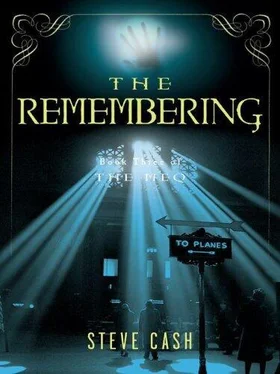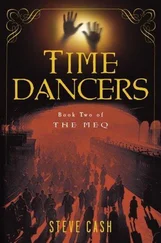“Now the irony is complete,” she said, lying back in the dark and laughing to herself.
“Irony?” I asked.
“I found the Octopus only to discover that it was empty, and after all my efforts at safeguarding, it seems the papyrus found its way to Umla-Meq quite easily … and without me.”
I laughed once along with her and thought about Ray and his good fortune in finding the papyrus. Or did luck really have anything to do with it? Before I could answer myself, Susheela the Ninth said, “You must now tell me what the papyrus says, Z. I have pondered this mystery for too long.”
I thought back to the first time I saw the papyrus on board the Iona in the Canary Islands. I understood its meaning now no more than I did then. “If my memory serves,” I said, “it began with a title, ‘ Nine Steps of the Six ,’ then nine lines followed in a spiral—‘ The First One shall not know. The Second One shall not know. The Third One shall not know. The Fourth One shall not know. The Fifth One shall not know. The Living Change shall live within the Sixth One. The Five shall be drawn unto the Source Stone. The Living Change shall be Revealed. The Five shall be Extinguished. ’ ”
There was a moment of silence. Susheela the Ninth said, “Please repeat the last four lines, Zianno.” I did. We were lying on our tatami mats as usual. I felt her lean toward Sailor in the darkness. She whispered, “Whatever the true meaning of these ancient words, a Sixth Stone exists. It must, Umla-Meq, … it must.”
“I agree,” Sailor said. “But we should ask ourselves if these words are instruction, direction, or a warning, perhaps? The last line, ‘ The Five shall be Extinguished ,’ is both ominous and perplexing.”
“Like moths to a flame, we are,” Sheela said.
“What do you mean?” I asked.
“Just as ‘ The Five shall be drawn unto the Source Stone ,’ the Meq are drawn unto the Remembering.”
“Seventy-two years?” Sailor said.
“Seventy-two years?” I asked, then realized what he meant.
“Yes, Zianno, since the Time of Ice, those of us from the Pyrenees have believed we know the date of the Remembering, and it arrives in a mere seventy-two years. This amount of time will pass in the blink of an eye for us, yet still we chase the essential nature and purpose of the Remembering. Even its location continues to elude us.”
The lights of Osaka glowed no brighter than starlight through the open windows. I could hear traffic sounds and horns in the distance, but not many. We talked until dawn about the papyrus, the Remembering, and the stone balls Geaxi and I had discovered, as well as the one from which the papyrus had been copied. Why could I read the entire script of the papyrus carried by Susheela the Ninth and yet be unable to decipher no more than a single word on the stone ball Opari and I had seen in Cuba? There were many theories discussed, but no conclusions were reached. Two more weeks of late-night conversations and waiting followed. In the meantime, General Douglas MacArthur and his staff took up residence in Tokyo, while the U.S. Army gradually and peacefully occupied other parts of Japan. On September 15, Sailor finally thought the time was right to put his “plan” into action, though in reality it became more like performing an impromptu one-act play than executing a “plan.”
The day was unusually hot and bright and without a hint of autumn in the air. Susheela the Ninth, Sailor, and I stood alongside Katsuo in the grass courtyard of the white-walled American Embassy in Tokyo. Ikuko was standing nearby, but she would wait for us outside. Katsuo wore the long, formal robes of a Shinto priest, and they were causing the big man to sweat profusely.
“This should not take long, Katsuo,” Sailor said. He was staring up at the enormous American flag flying over the embassy. “Our story shall command the immediate attention of the Americans, and I would not be surprised if we were on our way to Hawaii within a day, two days at most.”
“How can you be so certain?” I asked. I’d had my doubts ever since I first understood Sailor’s “plan.” “What if it goes differently, what then? What is our alternate ‘plan’?”
Sailor smiled. “Zianno, please, you should know better,” he said, motioning Katsuo forward. We all began walking toward the entrance to the embassy. Sailor looked over and gave me a quick wink of his “ghost eye,” which was still perfectly clear.
Climbing the steps leading into the embassy, I felt the stares and heard the hushed comments from everyone coming or going. Katsuo paid little attention and led us inside and directly up to an Army lieutenant sitting behind a long desk labeled “INFORMATION” in English and Japanese. The lieutenant seemed surprised by Katsuo’s formal dress and height, but his eyes widened and his mouth dropped open when he saw us. Children with Western features, including one with black skin, were simply not supposed to be in Japan.
“What the hell …?” the man said.
Katsuo ignored the comment. Bowing once with great dignity and speaking Japanese, he calmly asked to see whoever was in charge of “missing persons.”
The lieutenant turned quickly to a Japanese man in civilian dress standing off to one side of the desk “Ichiro,” he commanded, “tell this man … tell these children … to wait here. Just tell them to wait here. I’ll be back shortly. Don’t let them leave the embassy, Ichiro. Just tell them to wait a few minutes.” The lieutenant rose from his seat and glanced once more at Sheela, Sailor, and me. He shook his head back and forth and walked away at a rapid pace. Ichiro and Katsuo had a short conversation. Katsuo feigned anger in response, dismissing Ichiro with a wave of his hand, but glancing at Sailor with a trace of a smile. Things were going well.
While we waited, Sailor unconsciously twirled an imaginary star sapphire around his forefinger. He had removed the real one, keeping it hidden inside his pants pocket. We both carried our Stones. In less than three minutes, the lieutenant returned and told Ichiro to instruct us we were all to follow him, and Ichiro was to accompany us. Katsuo grunted approval and we were led down a wide hall until we came to a door labeled “CAPTAIN BLAINE HARRINGTON.”
The door was open, but the lieutenant stopped and knocked twice before entering. Captain Blaine Harrington sat behind his desk, which was spotless and almost bare, as was the rest of his office. He was leaning forward with his elbows resting on the desk and his hands folded together. He seemed young for a captain, maybe mid-twenties, and his unsmiling, stern demeanor did not match his boyish looks. His hair was cropped short in a military crew cut and he wore wire-rimmed glasses, which were too small for his large blue eyes. He motioned Katsuo to sit, then waved his hand in a circle, indicating for Katsuo to explain himself and tell his story.
Katsuo nodded and removed his formal headgear, but the long robes were still uncomfortable and beads of sweat gathered on his upper lip and forehead. He began recounting our tale to the captain, though he was speaking to Ichiro. He talked for twenty minutes in Japanese, enriching his speech with elaborate gestures and intermittent praises to the gods. And it was a tall tale indeed. Katsuo explained that Sailor and I had been Cuban born, while Susheela the Ninth was from Guyana. The three of us were the adopted children of a Brazilian industrialist and his wife, who were all traveling together through Japan during the late autumn of 1941. After a brief stay in Nagano, our touring car had crashed deep in the mountains, not far from Katsuo’s village. The three of us survived the crash, escaping with only minor injuries, but our parents were killed. The date was December 6. Of course, as Katsuo emphasized, the next day changed everything. With war declared on America and the West, too many questions and problems might present themselves, for us as well as the village, should the priests turn us over to the authorities. Instead, they decided to hide and protect us until the war was over. Katsuo paused and took in a long breath, letting it out slowly, like a long overdue sigh. He looked once in our direction, then directly at the young captain. “Atara! The day has come,” he said.
Читать дальше












